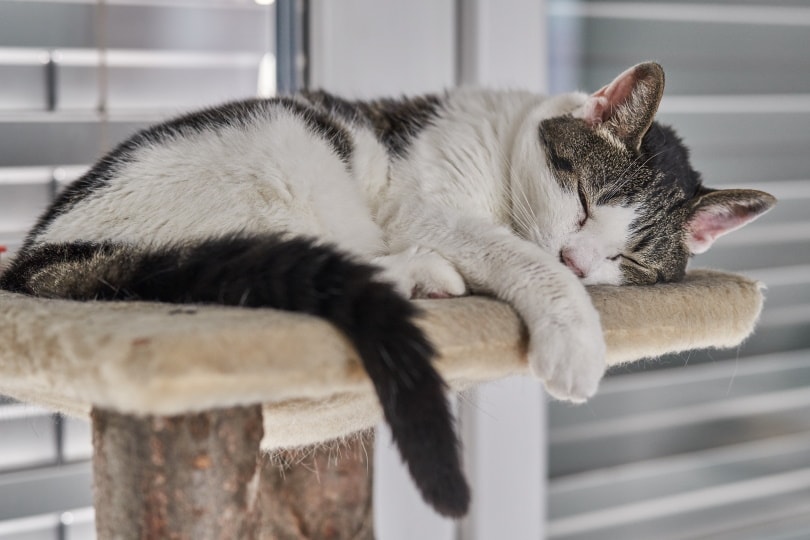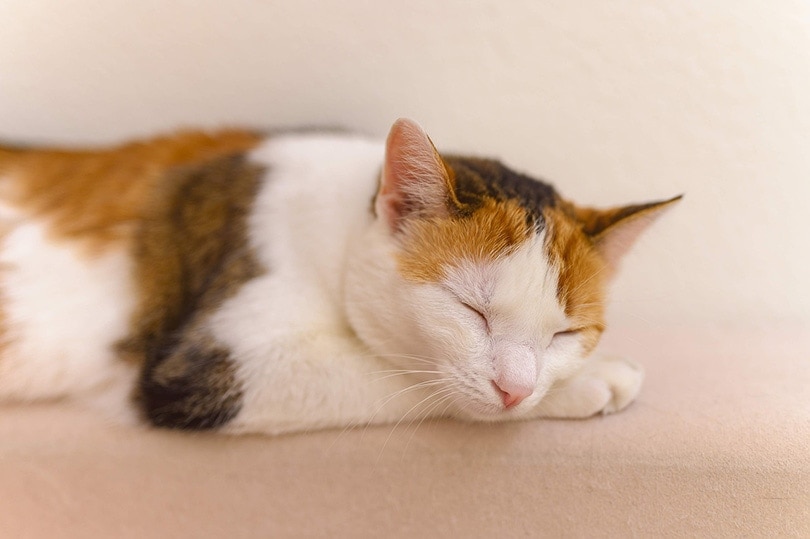Why Do Cats Play With Small Prey Before They Kill Them? Hunting Behavior Explained

Updated on
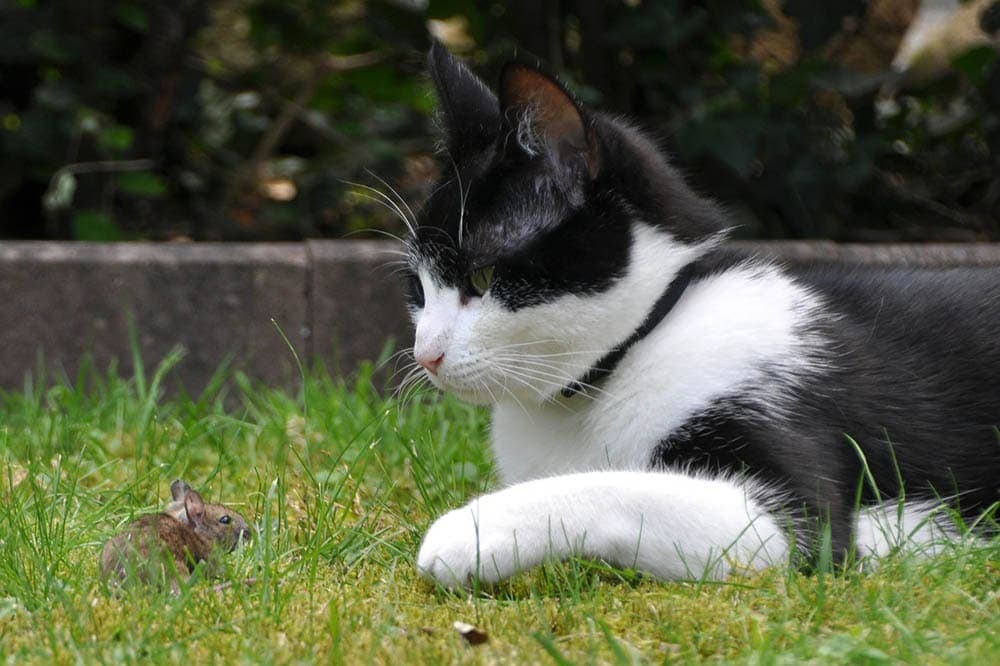
Although some cats are more active than others, most cannot resist chasing after a rodent or bird. Some breeds have higher prey drives than others, but all cats are instinctually driven to hunt. Kittens who learn hunting skills and become accustomed to eating wild prey from their mothers are more likely to succeed in hunting as pets than kittens raised indoors from a breeder.
If you’ve seen a cat killing its prey, you may have wondered, why do they play with their prey before killing it? Cats sometimes bat their victims around before the final bite, and their ancestors used the same technique. Cats look like they’re playing, but they’re only trying to wear their prey out so they can kill them without injuries. An injured rat or bird can quickly strike the cat’s eyes or face if it comes too close, and the cat understands the danger and begins hitting its target as a survival tactic.
Hunting Behavior of Cats
Although hunting is an instinct, cats’ behavior towards wildlife sometimes gives them a bad reputation. When a cat chases a squirrel up a tree, it seems harmless and playful, but when the animal appears to torture a victim before killing it, the act seems cruel. Cats are domesticated creatures, but the drive to hunt is not a trait that can be diluted or eliminated from training.
Feral Cats
Except for lions, most large cats hunt alone. Feral cats also enjoy solitary hunting, but they learn to adapt to suburban environments by forming groups to increase their chances of survival. Dogs, coyotes, and wild cats like Bobcats can prey on feral cats, and their hunting territory is no longer limited to rural areas. As human developments expanded, the habitats of wild animals became smaller, and the animals eventually learned to forage and hunt closer to humans.
Feral cats will hunt in packs, but they still prefer to hunt alone. Unlike outdoor house cats, feral kitties have to hunt to stay alive. They’re most active at dawn and dusk and spend most of the day hiding from predators in natural or man-made shelters. Suburban feral cats are friendlier towards humans than rural kitties because they often receive food from people who feel sorry for them. However, public feeding is discouraged in most countries.
Some countries with large feral populations consider the animals invasive species that threaten local wildlife, damage gardens, and spread disease. In Australia, feral cats are blamed for eliminating 20 Australian mammals and disrupting species reintroduction programs.
While feral animals are a problem in Australia, some territories take humane approaches to managing the populations. In Victoria, feral cats cannot be shot by citizens on Crown land. Any private landowners who trap feral cats must turn them over to local wildlife officials to scan the animals for microchips.
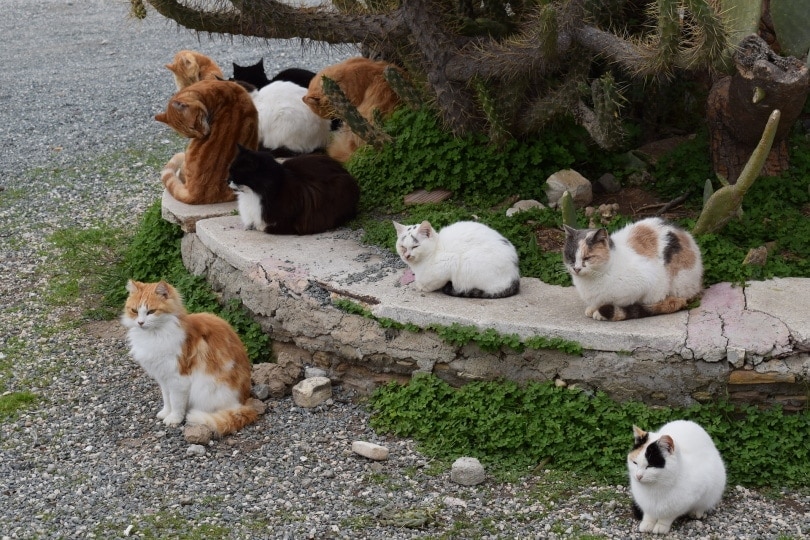
Outdoor House Cats
The hunting behavior of house cats is similar to feral animals, but inexperienced house cats who have only recently been allowed to wander outside are not as likely to kill their prey as skilled outdoor hunters. Housecats are also more likely to play with their victims and walk away without eating.
Some feline researchers believe that while playing with prey is related to the cat’s survival instinct, it occurs more with pet cats because they have a pent-up urge to hunt. Since house cats are typically fed by their owners, they’re not always hungry enough to consume their prey, but they still enjoy the thrill of hunting and going through the motions.
Hunting is not entirely instinctual, and most pet cats raised indoors do not learn advanced moves like killing a victim with a bite to the jugular vein. In contrast, feral cats are raised by and spend more time with their mothers. They learn how to kill quickly and move on to evade detection from larger predators. If a housecat is abandoned by its owners, it may eventually adapt to the outdoor environment and gain more confidence and success in catching and killing prey.
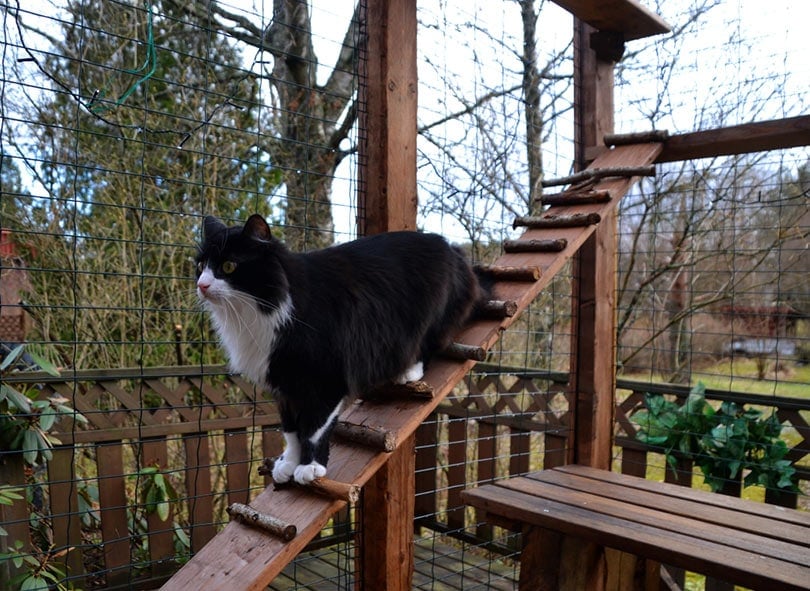
The Danger of Housecats Hunting Wildlife
Some cat owners believe confining cats indoors is inhumane, but indoor cats can live 15 years or more indoors while outdoor cats are lucky to live five years. An outdoor cat’s lifespan can be reduced to as little as two years in areas with large predator populations. Allowing a pet to wander outdoors is a dangerous choice when considering the multitude of threats lurking outside.
- Automobiles: Busy highways are deadly for cats due to the higher speed limits, but outdoor cats are also killed in neighborhood streets and dirt roads in rural areas.
- Wildlife traps: A neighbor may intend to catch a raccoon with a trap set up beside a garbage can, but an unlucky house cat could fall into the same trap and spend several hours or days exposed to harsh weather.
- Rodent poison: Cats can die from eating rat poison when they’re outside, but they’re also at risk of perishing from eating a poisoned rodent.
- Predators: Coyotes and other predators were more common in rural animals several years ago, but they’re slowly making their way into developed areas. Coyotes are now residents in all 50 states.
- Disease: Eating a rodent in the wild can transfer diseases like rabies and parasites such as hookworms and roundworms.
- Sadistic humans: Although the myth that black cats are adopted from shelters so Satanists can use them in rituals is untrue, the world has plenty of unscrupulous characters that hate cats and consider them pests.
You cannot remove the hunter from the feline, but you can protect your pet by keeping it indoors and stimulating its desire to hunt with other activities.
The 4 Ways to Prevent Your Cat From Hunting
Domesticated cats evolved from wild cats, and dogs evolved from wolves, but cats retain more traits from their ancestors than dogs. Essentially, dogs are more domesticated than cats, even with regard to their diets. Over time, dogs acquired more of the amylase gene that helps them break down starch. They’re now accustomed to an omnivorous diet, but cats lack enough of the enzyme and must rely primarily on meat to live healthy lives.
This biological need to consume high-protein diets may mean that humans will never convince their cats to control their hunting tendencies. However, pet parents can use these methods to keep wild instincts under control.
1. Toys and Games
Most cats like playing with toys that resemble prey, and unlike dogs, a cat will not enjoy attacking a giant stuffed animal. Mouse toys and wand toys with feathers are ideal because they’re similar in appearance to birds and rodents. Although some breeds are more active than others, you can play catch or hide and seek to satisfy hunting instincts.
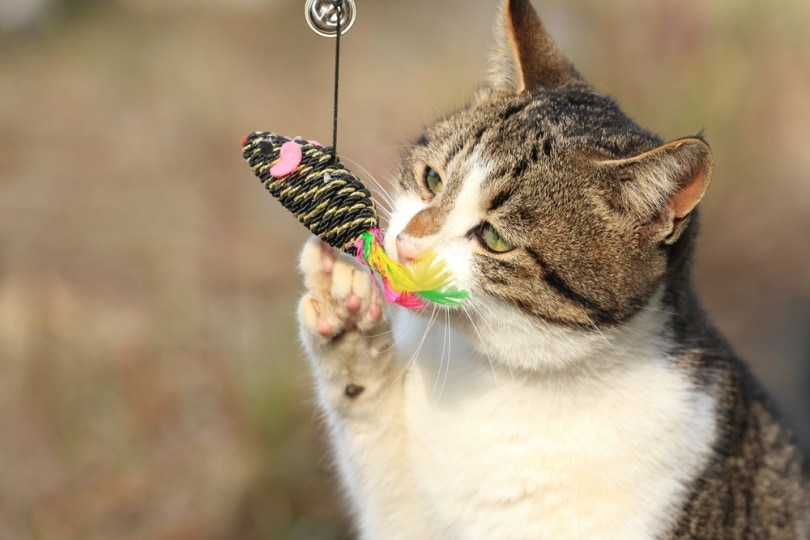
2. Premium High-Protein Meals
Feeding your pet a healthy high-protein diet can reduce the urge to kill and drop corpses at your doorstep. It will not keep them from chasing prey, but it will reduce the need to kill the animal. Although many veterinarians and researchers speculated that well-fed felines are less motivated to consume wild game, a study published in March 2021 proved the theory. Cats are not motivated by hunger to hunt, but hungry cats are more likely to kill and consume prey.
3. Cat Runs
If you’re unable to play with an indoor cat every day, you can install a cat run in your yard so the animal can exercise and observe wildlife safely. Some designs attach to a window or cat door, so your cat can enter the structure at any time.
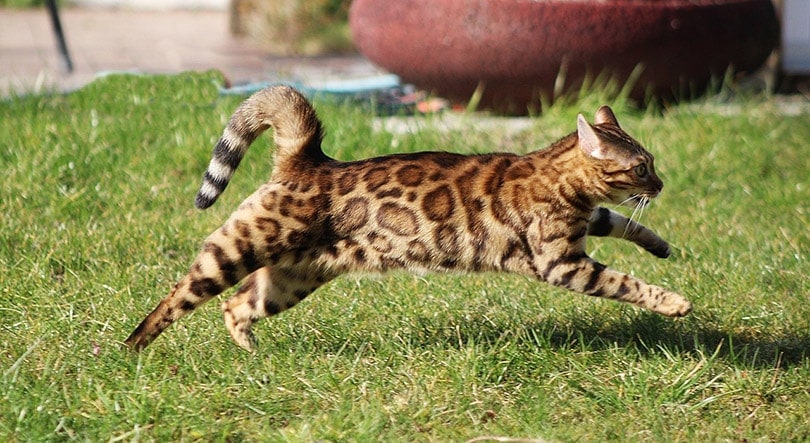
4. Fence Nets
They’re not the most attractive method for keeping cats confined to backyards, but the netting is incredibly effective at preventing escapes. The nets are angled at 45 degrees to keep the cat from jumping over the fence.
Summary
Scientists and veterinary experts do not entirely understand feline hunting behavior, but decades of research indicate that playing with prey is instinctual rather than merely sadistic. As humans, we try to find hidden motives in animals’ actions, but a strange feline behavior can often be attributed to genetics and traits learned from parents. Although studying a cat’s hunting techniques is beneficial, it’s best to keep your cat indoors and leave the hunting games for feral animals and test subjects.
Featured Image Credit: estockiausdel, Pixabay


